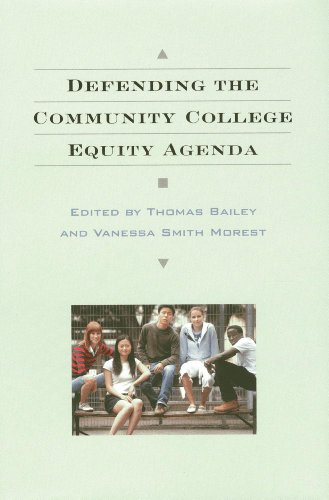Community colleges enroll almost half of all undergraduates in the United States. These two-year colleges manifest the American commitment to accessible and affordable higher education. With about 1,200 institutions nationwide, community colleges have made significant progress over the past decade in opening access and have become the critical entry point to higher education for many Americans who traditionally have been left out of educational and economic opportunity. Yet economic, political, and social developments have increased the challenges community colleges face in pursuing an "equity agenda." Some of these include falling state budgets combined with growing enrollments, a greater emphasis on outcome-based accountability, competition from for-profit institutions, and growing immigrant student populations.
These trials come at a time when community colleges confront crucial economic and workforce development pressures that may impact their mission. How can community colleges continue to maintain their open-door policies, support underprepared students, and struggle to help enrolled students complete degrees and certificates that prepare them for success in the workplace?
Building on case studies of colleges in six states—New York, Texas, Florida, California, Washington, and Illinois—this volume offers a fresh examination of the issues currently facing American community colleges. Drawing on their fieldwork supplemented by national data, the authors analyze how these challenges impact the community college mission of educational opportunity—especially for low-income students, students of color, and other underserved groups—and how colleges are responding to a drastically different environment. They then propose a set of strategies to strengthen the role of community colleges in providing both access and opportunities for achievement for all students.
"As the authors point out, financial barriers and lack of adequate preparation are limiting both access to and success in higher education. Community colleges are the best hope for overcoming those barriers. If we are to make progress on the 'equity agenda,' we must address the issues that are raised in this publication. My thanks go to the Community College Research Center for bringing focus to the important roles that community colleges play against significant odds."
(George R. Boggs, President of the American Association of Community Colleges)
"Community colleges are the primary sites where our nation's commitment to access and opportunity for higher education will be realized. This excellent volume examines all aspects of this agenda for educational equity, contributing significantly to our knowledge about the strengths and weaknesses of this vital sector of American higher education. Must reading for those concerned with the development of human capital in a time of scarce resources and conflicting priorities for public investment."
(David Breneman, University Professor and Dean, Curry School of Education, University of Virginia)
"A significant and provocative book that will raise awareness about the issues and challenges facing community colleges as they seek to expand access and promote equity within our higher education system."
(Carolyn Williams, President of Bronx Community College)
"A thorough, insightful, balanced, and readable assessment of the progress and prospects of achieving educational equity through our community colleges. Defining 'the equity agenda' as student preparation for, access to, and success in college, the authors urge that the colleges focus on results: on each individual student.s progress, particularly that of low income and minority students. Both the difficulties and the opportunities of this focus are set out in detail. The book could not be timelier, for America's future in the knowledge-based global marketplace will require substantially raising the educational attainment of almost everyone in the coming generations. Success or failure in doing so will hinge in no small part on whether the community colleges can fulfill their 'equity agenda.'"
(Pat Callan, President of the National Center for Public Policy in Higher Education)
"Community college leaders, researchers, and policy makers will all find this book useful and thought provoking."
(Pamela L. Eddy
Review of Higher Education)
"The book provides a nuanced, qualitative look at several critical and controversial community college activities."
(Barbara K. Townsend
Journal of College Student Development)
"Defending the Community College Equity Agenda stands out from most academic essay collections... It is a richly documented, artfully presented, and highly readable work."
(Mary Taylor Huber
RedOrbit News)
"A richly documented, artfully presented, and highly readable work."
(Mary Taylor Huber
Change)
![]()
